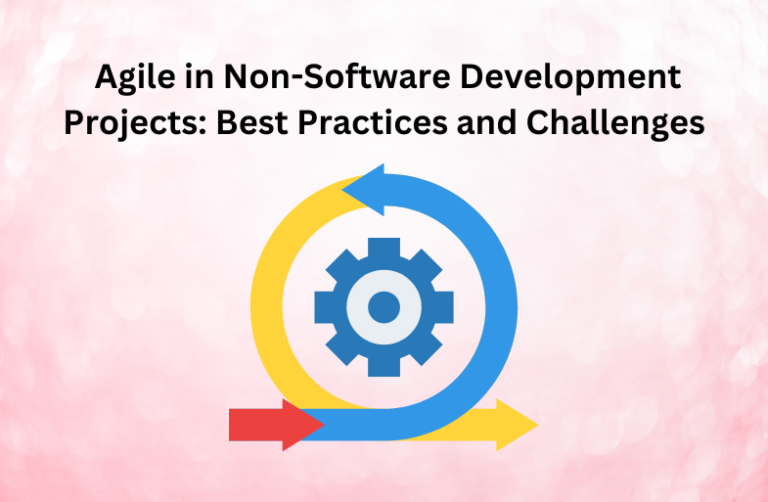Despite Agile methodology’s foundations in software development, its concepts and practices have expanded well beyond the boundaries of computer science. Marketing campaigns, building projects, product development, and other non-software development projects are adopting Agile. This growth exemplifies Agile’s adaptability and efficiency for handling complicated project management and providing value to stakeholders.
This blog discusses the adoption of Agile Methodology into non-software development projects. We’ll cover best practices, challenges organisations may face, and how to overcome them. An Agile Course can help anyone, from beginners to experienced professionals, learn the fundamentals of the methodology and how to apply it to various types of projects.
Table Of Contents
- Understanding Agile Methodology in Non-Software Projects
- Best Practices for Agile in Non-Software Projects
- Challenges of Agile in Non-Software Projects
- Conclusion
Understanding Agile Methodology in Non-Software Projects
Agile methodology is known for its incremental and iterative approach to project management, which prioritises teamwork, adaptability, and customer input. Even though Agile is most often linked with software development, its principles have been effectively implemented in non-software projects to boost productivity, flexibility, and stakeholder happiness. Project dynamics, team composition, and organisational culture must be carefully considered when implementing Agile in non-software projects to achieve successful outcomes.
Best Practices for Agile in Non-Software Projects
Define Clear Objectives and Scope
If you start by outlining these details, team members and stakeholders will have a common understanding of the project’s goals, scope, and deliverables. Well-defined goals enhance the decision-making process and align project activities with desired outcomes.
Tailor Agile Practices to Suit Project Needs
Modify Scrum or Kanban, two Agile frameworks and practices, to fit the needs of non-software projects. Keep Agile’s guiding principles in mind while you adapt the language, rituals, and artefacts to suit your project’s needs and the dynamics of your team.
Foster Cross-Functional Collaboration
Members of cross-functional teams, including stakeholders from various departments or fields, should be encouraged to communicate and work together. Encourage open communication, the exchange of information, and group problem-solving to use different viewpoints and skills.
Embrace Iterative Delivery and Feedback
Divide the project deliverables into smaller, more manageable pieces and rank them according to their importance and how they depend on each other. It is recommended to adopt iterative delivery cycles to provide stakeholders with incremental value and to gather feedback frequently to guide subsequent iterations.
Maintain Flexibility and Adaptability
Keep an open mind when planning and carrying out the project; this will help you embrace change and uncertainty. Maximise value delivery while mitigating risks by continuously assessing project priorities, responding to emerging requirements, and adapting plans and strategies accordingly.
Challenges of Agile in Non-Software Projects
Cultural Resistance and Organisational Alignment
When implementing Agile practices in domains other than software, overcoming cultural resistance and guaranteeing organisational alignment can be difficult. It takes strong leadership, good communication, and stakeholder buy-in to tackle resistance to change, established processes, and hierarchical structures.
Limited Experience and Expertise
Problems with implementation and misunderstandings regarding Agile methodology can arise when non-software teams need more experience and knowledge in Agile practices. It is wise to fund mentoring, coaching, and training programmes to develop Agile skills and encourage a growth mindset.
Regulatory Compliance and Documentation Requirements
Agile principles may be at odds with non-software projects’ documentation and regulatory compliance needs. It can be challenging to uphold Agile principles while complying with industry standards, legal requirements, and documentation needs. Striking a balance between documentation needs and Agile’s emphasis on delivering functional solutions might necessitate meticulous process adaptation and negotiation.
Resource Constraints and Stakeholder Expectations
Time, money, and workforce are all resources that non-software projects might be short on, which can hinder the adoption of Agile methods. Successful resource allocation, prioritisation, and communication are essential for managing stakeholder expectations and balancing competing priorities by Agile principles. Project schedules and deliverables may sometimes be in sync with stakeholder expectations, especially in ever-changing environments where needs are constantly changing.
Read Also: How Prefab Warehouses Are Transforming Logistics and Storage
Conclusion
Agile methodology goes beyond software development by providing a versatile and adaptable approach to project management. Non-software teams that embrace Agile principles and practices can enhance collaboration, responsiveness, and value delivery in diverse project contexts. Nevertheless, meticulous planning, customised practices, and organisational support are necessary to implement Agile successfully in projects that do not involve software.
If professionals want to learn how to implement Agile principles in settings other than software development, they should enrol in an Agile course. Organisations can improve project outcomes, drive innovation, and stay competitive in today’s dynamic business landscape by utilising Agile methodology and best practices.


